Protest Against Cyrillic Alphabet in Zagreb, but not Exactly
Adelina Marini, April 10, 2013
On Sunday, April 7th, on the central square in Zagreb, a mass protest took place against the introduction of the Cyrillic alphabet. In fact, this sentence is not very precise. The protest was not against the Cyrillic alphabet in general, but against its introduction specifically in Vukovar, Croatia's biggest wound from the secessionist war from former Yugoslavia in the early 1990s of the past century. Cyrillic in Croatia is associated with Serbs, Orthodox Christianity, too. To us, as Bulgarians claiming ownership of the Cyrillic alphabet, it seems odd being the first to make that writing official in the EU with our accession in 2007, it could be possible someone to protest against our national writing which is also used by millions of Russians, Macedonians, Serbs, Ukrainians, Montenegrins, all of whom have minorities in Croatia. Alas, it is not that simple.
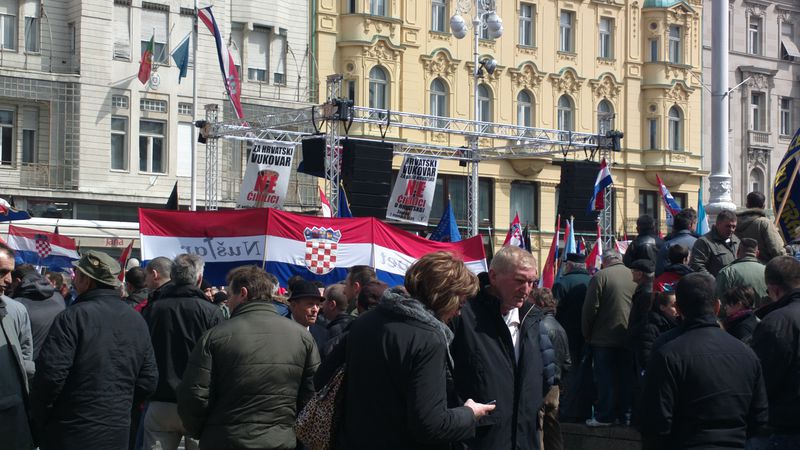
In the Constitution of the independent Republic of Croatia, under Article 15, it is enshrined that equality is guaranteed of the members of all national minorities, including of the Serbs, but also of the Bulgarians whose minority is also official in Croatia, though very small (according to the last census in Croatia in 2011, as Bulgarians in Croatia have defined themselves 350 people in the entire country, which is 0.01% of the entire population). Rasko Ivanov, chairman of the Bulgarian minority in Croatia believes that there are many people who for one reason or another preferred not to say they are Bulgarians, but their number is unknown and is hardly much bigger. The minorities' rights are arranged in a special constitutional law which is a kind of intermediary legislation - it has higher degree above the regular laws, but is under the Constitution.
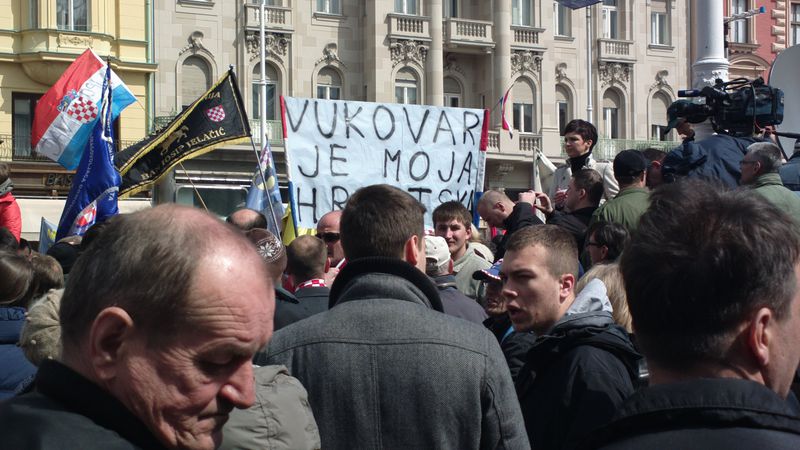
Such a law Croatia has endorsed as early as in 2002 when a prime minister was Ivica Racan as a prerequisite the country to begin accession negotiations. In Article 10 of the constitutional law it is enshrined that the members of national minorities have the right to freely use their language and writing privately and publicly, including to use signs and information boards in their own language and writing in full respect of the law. And in Article 12 it is specified that such a use can be secured by the local authorities if a minority represents a third of the inhabitants of a town or village.
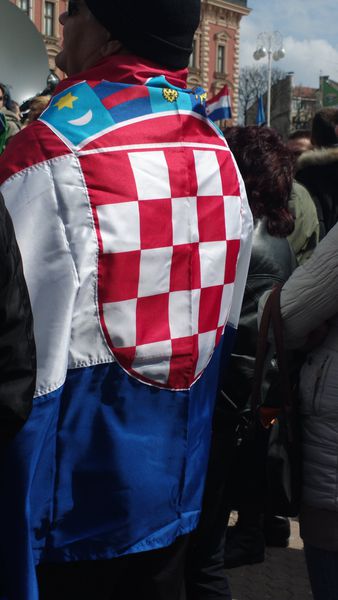 According to the last census and the last elections, in Vukovar the Serbs represent a third of the population, but many of the opponents of the introduction of bilingual writing and especially of the Cyrillic alphabet in Vukovar claim that the data are not reliable. Reliable or not, the law provides the possibility signs in Cyrillic and in Latin to be installed in "a reasonable period of time". The question is what does "reasonable period of time" mean. The organisers of the protest, a Staff for Protection of Croatian Vukovar, demand a moratorium over the introduction of bilingual signs specifically in Vukovar. During the protest on Sunday, the Staff demanded amendments to the constitutional law for protection of national minorities postponing the introduction of the Cyrillic. "Vukovar has to be a place of special homage in the country, there to be no street or anything. We want war crimes to be pursued, to make the list of inhabitants right", underscored Tomislav Josic, president of the Staff. In the beginning of the year he secured meetings with President Ivo Josipovic and with the speaker of Croatia's Parliament (Sabor).
According to the last census and the last elections, in Vukovar the Serbs represent a third of the population, but many of the opponents of the introduction of bilingual writing and especially of the Cyrillic alphabet in Vukovar claim that the data are not reliable. Reliable or not, the law provides the possibility signs in Cyrillic and in Latin to be installed in "a reasonable period of time". The question is what does "reasonable period of time" mean. The organisers of the protest, a Staff for Protection of Croatian Vukovar, demand a moratorium over the introduction of bilingual signs specifically in Vukovar. During the protest on Sunday, the Staff demanded amendments to the constitutional law for protection of national minorities postponing the introduction of the Cyrillic. "Vukovar has to be a place of special homage in the country, there to be no street or anything. We want war crimes to be pursued, to make the list of inhabitants right", underscored Tomislav Josic, president of the Staff. In the beginning of the year he secured meetings with President Ivo Josipovic and with the speaker of Croatia's Parliament (Sabor).
Prime Minister Zoran Milanovic is of the opinion that the law must be respected. In an interview with the Croatian National TV on Sunday he recalled that the rights of minorities are guaranteed by the Constitution and rejected the possibility of amendments to the constitutional law for the minorities, although he did not answer unequivocally the question about the demanded amendments. The premier also called the issue not to be politicised in view of the upcoming on May 19th local elections and predicted that the introduction of bilingual signs will continue after the elections. We have to respect the law, he underlined. The same call conveyed the EU delegation chief in Zagreb, Paul Vandoren.
In the last European Commission report which says that in general Croatia is prepared to become the 28th EU member state as of July 1st, the issue with Cyrillic alphabet is specifically highlighted: "The government continued to take measures in order to raise awareness for persons belonging to national minorities and ensure the exercise of their rights. It is welcome that the government continues to ensure the implementation of the constitutional provisions on the use of the Cyrillic script in the city of Vukovar, where Croatians of Serb ethnicity account for 38.5% of the population".
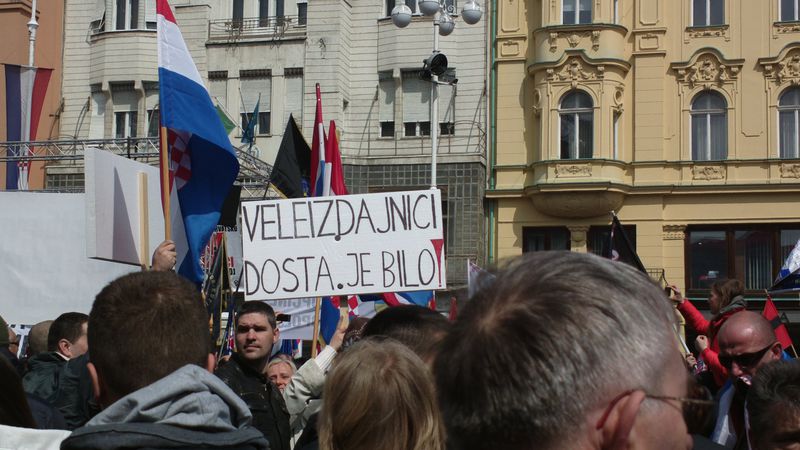
The leader of the biggest opposition party - Croatian Democratic Union (HDZ), Tomislav Karamarko, wrote in a special Facebook status to be respected Article 8 of the constitutional law on minorities which calls the rights and freedoms of the members of national minorities to be interpreted and applied with maximum respect of the national minorities and the Croatian people, with full understanding, solidarity and dialogue. According to him, because of the developments in Vukovar after the government decision to begin gradual installation of bilingual signs, there is a danger of violations of that Article. In his status Mr Karamarko recalls that Vukovar endured destruction, murders, banishment and that there is no family in the city that does not mourn dead relatives or who do not search for disappeared members of the family. "With this I once again call upon our fellow citizens Serbs to take into account the feelings of their Croatian countrymen and to the interest of their co-existence to ask the government to postpone the introduction of bilingual sings".
Tomislav Karamarko's party, however, is in a tough situation at the moment because it continues to lose popularity among the population, in spite of the austerity policies and the growing unemployment under the more than one year old government of Zoran Milanovic's Socialists. It is expected very soon HDZ to come up with a new vision and strategy for the future. Probably, part of it will be a little bit more nationalistic tone which can already be felt in the statements of the leader, Karamarko. But Prime Minister Milanovic said on a number of occasions that the minority law has been introduced by the HDZ government and also that during their governance in Vukovar the necessary one third of Serbs was secured.
Rasko Ivanov, who spoke in personal capacity to euinside, not as a chairman of the association of Bulgarians in Croatia, believes that this is rather a political issue. The protest against the Cyrillic alphabet is a cover for bigger problems Croatians have and their anger is mainly aimed at the government. But he recalled that in the entire debate that has been taking place for several months now, the fact that the Cyrillic is an official writing of the EU is not mentioned at all. According to him, there are no reasons for concern for the other minorities who use Cyrillic because, indeed, this is an entirely internal topic which is very sensitive for the Croats 20 years after the War for the Homeland, as it is called here.
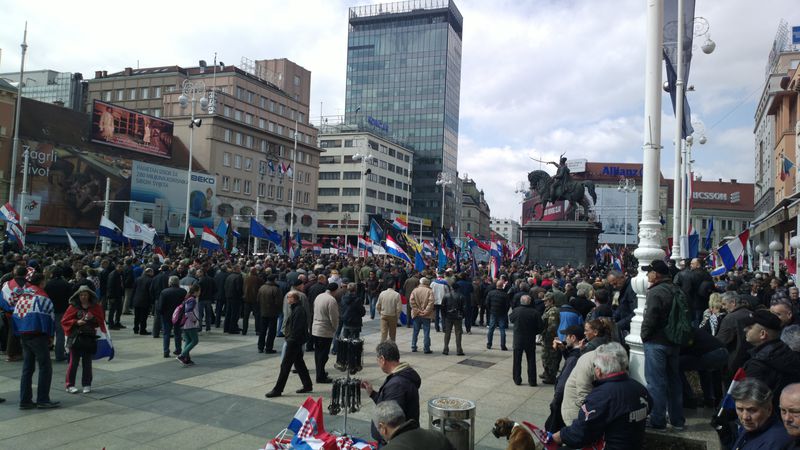
The protest on Sunday was peaceful, there were many patriotic songs and the anthem was sang too. Among the protesters there were many young people, families with their kids, elderly people. veterans from the war, members of various patriotic organisations. But, as a colleague from the Croatian National Television summarised it, this is another test for Croatia on its path into the EU.
 Kolinda Grabar-Kitarovic | © KGK
Kolinda Grabar-Kitarovic | © KGK Jozo Rados | © European Parliament
Jozo Rados | © European Parliament Aleksandar Vucic, Andrej Plenkovic | © Vlada RH
Aleksandar Vucic, Andrej Plenkovic | © Vlada RH